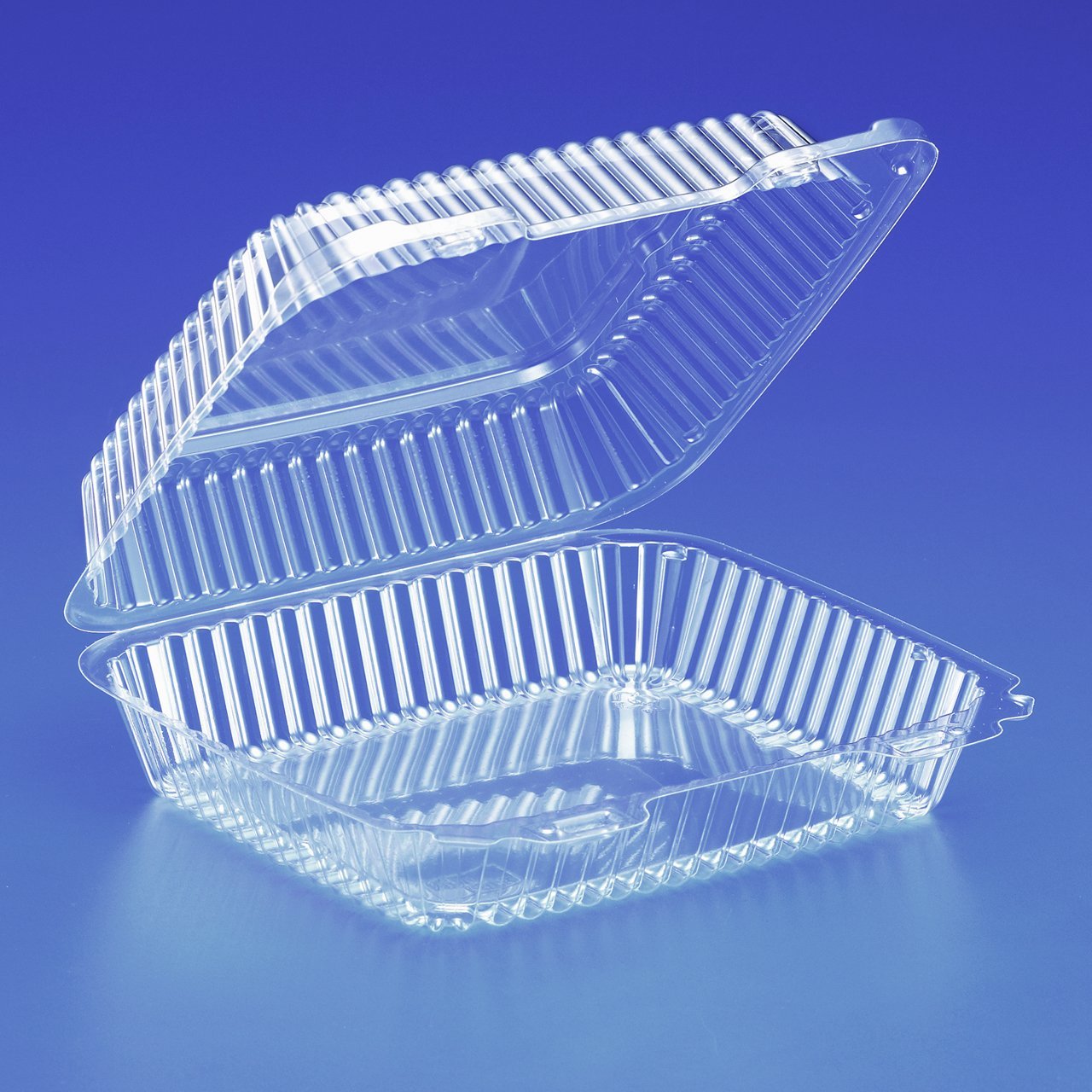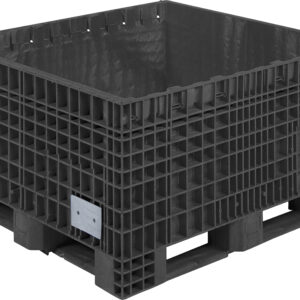Find out how plastic bulk containers can increase efficiency for your operations
Wiki Article
A Comprehensive Overview to the Different Kinds Of Bulk Plastic Containers Available Today
Bulk plastic containers play a critical role in different sectors, using services for storage space and transportation. Their varied kinds provide to different requirements, from rigid choices for strong materials to flexible containers fitting different shapes. Each type provides unique benefits, making it vital to understand their applications and functions. As sectors develop, so do the demands for effective container services. What elements should one consider when picking the right bulk container?Overview of Bulk Plastic Containers

Types of Bulk Plastic Containers
Bulk plastic containers come in different types, each matched to particular applications. Inflexible bulk containers, versatile bulk containers, and intermediate mass containers stand for the key groups, each offering distinct benefits. Recognizing these kinds is vital for selecting the best container for carrying and keeping materials.
Rigid Bulk Containers
Rigid mass containers are important for effective storage space and transport of various materials across sectors. These containers are usually constructed from resilient plastics, permitting them to endure rough handling and ecological problems. They are available in numerous shapes and dimensions, consisting of drums, bins, and totes, making them ideal for storing every little thing from granular substances to liquids. Rigid containers often feature enhanced wall surfaces and secure covers, making sure the materials continue to be secured throughout transportation. Their stackable design optimizes storage area, making them ideal for stockrooms and manufacturing facilities. Furthermore, several stiff mass containers are multiple-use and recyclable, contributing to sustainability efforts. Generally, their robustness and adaptability make stiff bulk containers a crucial component in supply chain procedures.Adaptable Mass Containers
Adaptable mass containers, typically described as adaptable intermediate bulk containers (FIBCs), function as a functional solution for carrying and keeping a selection of dry products. These containers are generally made from woven polypropylene and are developed to be lightweight yet strong, enabling reliable handling and piling. Their adaptability enables them to fit numerous sizes and shapes, making them suitable for products ranging from grains to chemicals. FIBCs can be geared up with features such as spouts for easy filling and discharge, as well as safety finishings for improved toughness. In addition, they are recyclable and reusable, contributing to sustainable practices in markets like farming, food handling, and building and construction. In general, versatile mass containers use a affordable and efficient choice for mass product monitoring.Intermediate Bulk Containers
Intermediate bulk containers (IBCs) are necessary for the efficient transportation and storage of liquids and granular materials throughout numerous sectors. These containers normally have an ability ranging from 275 to 330 gallons and are designed for easy managing and stacking. Made from resilient products like high-density polyethylene or steel, IBCs offer exceptional defense against contamination and ecological aspects. Their style includes functions such as an integrated pallet for forklift access and a removable top for easy filling and cleansing. IBCs are extensively used in chemical, food, and pharmaceutical sectors, guaranteeing conformity with safety laws. Their versatility and reusability make them an economical service for bulk storage and transport, contributing to provide chain performance and sustainability.Attributes and Benefits of Bulk Plastic Containers
Mass plastic containers are important tools in various sectors, offering a combination of durability and practicality. These containers are created from premium products, making them resistant to impacts, chemicals, and environmental variables. This toughness warranties product safety and security during storage and transport.Additionally, mass plastic containers are lightweight, helping with ease of dealing with and reducing shipping expenses. Their stackable style takes full advantage of storage performance, permitting enhanced storehouse area. Numerous versions include secure covers or closures, offering an impermeable seal that preserves components and protects against contamination.
Mass plastic containers are commonly multiple-use and recyclable, contributing to lasting techniques. Their adaptability permits a variety of applications, from food storage space to industrial usage, improving their value throughout industries. Services gain from the long lifespan and reduced maintenance requirements of these containers, making them an economical remedy for both long-lasting and short-term demands.
Industries That Use Mass Plastic Containers
Various industries take advantage of the use of bulk plastic containers, each leveraging their one-of-a-kind buildings for specific applications. The food and beverage market depends on these containers for risk-free storage and transport of products, while the chemical production industry utilizes them for taking care of dangerous materials. In addition, the pharmaceutical distribution requires emphasize the importance of resilience and tidiness in product packaging services.Food and Drink Market
As the need for risk-free and reliable storage space services continues to increase, the food and drink sector progressively depends on mass plastic containers for their functional demands. These containers provide robust, light-weight, and functional choices for keeping components, completed products, and waste materials. Made from food-grade materials, they guarantee compliance with health and wellness and security criteria. Various designs, such as stackable containers and tote boxes, optimize space during transport and storage space, improving logistical efficiency. In addition, the transparency of some mass containers enables very easy inventory administration, reducing the danger of perishing. With the sector's emphasis on sustainability, several suppliers are now providing reusable and recyclable options, aligning with environmentally friendly methods while fulfilling the high demands of food safety and security and hygiene.
Chemical Manufacturing Industry
The chemical production market counts greatly on bulk plastic containers for the efficient and risk-free storage space of basic materials, intermediates, and ended up items. These containers are made to withstand various chemicals, making sure that unsafe products do not leak or degrade the container itself. Typical kinds consist of high-density polyethylene (HDPE) and polypropylene containers, which offer outstanding chemical resistance and durability. Their lightweight nature and stackable design assist in transportation and storage, maximizing space in manufacturing centers. In addition, numerous mass plastic containers feature features such as tamper-evident seals and easy-to-read labeling, improving safety and compliance with market laws. Generally, mass plastic containers are important to the chemical production procedure, providing trustworthy solutions for handling diverse substances.Drug Distribution Requirements
Pharmaceutical circulation depends on bulk plastic containers to satisfy rigid security and regulatory needs. These containers are necessary for moving and storing a range of pharmaceutical products, including active pharmaceutical active ingredients (APIs) and finished medicines. Their style warranties protection versus dampness, light, and contamination, keeping the honesty of sensitive materials. In addition, mass plastic containers are compliant with sector standards such as Good Manufacturing Practices (GMP) visit site and are commonly made from materials that are FDA-approved. Using these containers boosts performance in the supply chain, enabling safe, large-scale distribution while lessening waste. Companies in the pharmaceutical field focus on using durable, leak-proof, and tamper-evident containers to assure item safety and security and quality throughout the logistics process.Considerations for Choosing the Right Container
When picking the suitable mass plastic container, various aspects need to be meticulously evaluated to ensure ideal functionality and security. The nature of the materials to be stored is critical; compatibility with the this page container's product can influence honesty and safety and security. Bulk Plastic Containers. Additionally, the container's size and shape should align with the storage and transport demands, ensuring efficient room useLoad capability is one more vital factor to consider, as it needs to suit the weight of contents without risk of damages or failing. The layout features, such as venting or covers, can impact functionality and access. Conformity with market policies is necessary, particularly in industries like pharmaceuticals, where safety and security requirements are rigorous.
The anticipated life expectancy and durability of the container need to be examined to validate it meets the operational demands without regular substitute. By reviewing these aspects, one can select the most appropriate mass plastic container for details applications.
Ecological Impact and Sustainability
As businesses increasingly prioritize sustainability, the environmental impact of bulk plastic containers has actually come under examination. These containers, typically made from materials such as polyethylene or polypropylene, contribute substantially to plastic waste otherwise taken care of appropriately. Their manufacturing entails the intake of nonrenewable fuel sources, which can bring about boosted greenhouse gas discharges. Nevertheless, improvements in recycling technology and the growth of biodegradable choices are helping to alleviate these problems.Several manufacturers are embracing practices that highlight the use of recycled products, thereby minimizing the demand for virgin plastics. The durability of bulk plastic containers likewise plays a function; they are developed to be reused several times, which can lessen their total ecological footprint when contrasted to single-use options. Ultimately, the market faces the challenge of balancing capability with eco-friendly obligation, making lasting practices important for the future of bulk plastic containers.
Best Practices for Storage Space and Transport
Reliable storage and transport of bulk plastic containers significantly affect both functional effectiveness and sustainability. To make the most of room, organizations need to stack containers safely, ensuring stability and protecting against damage. Appropriate labeling is necessary for easy recognition, which streamlines access processes. Furthermore, keeping a well organized and tidy storage space area reduces the danger of contamination and enhances security.For transportation, picking the appropriate vehicle is essential; containers must be secured to prevent shifting throughout transportation. Companies need to likewise take into consideration utilizing pallets to promote easier loading and dumping. Routine inspections of containers have a peek at this website for wear and tear can protect against costly replacements.
Temperature control is another crucial facet, as extreme conditions can compromise the honesty of the plastic. Training workers on best methods for taking care of and transportation warranties conformity and promotes a culture of security. By executing these finest methods, businesses can enhance their operational effectiveness while adding to ecological sustainability.
Often Asked Concerns
Just how Do I Tidy Mass Plastic Containers Successfully?
To tidy bulk plastic containers properly, one ought to rinse them with cozy water, make use of a moderate detergent and scrub with a soft brush. Rinse completely, after that enable to air dry totally prior to storage or reuse.What Is the Lifespan of Mass Plastic Containers?
The life expectancy of bulk plastic containers typically varies from 5 to 10 years, depending on the material, use, and ecological problems. Appropriate maintenance and storage can significantly extend their usability and sturdiness with time.Can Bulk Plastic Containers Be Custom-made?

Do Mass Plastic Containers Have Guarantee Options?

Are There Regulations for Utilizing Bulk Plastic Containers?
Yes, regulations exist for utilizing mass plastic containers, primarily concentrated on security, environmental impact, and product compliance. These laws ensure that containers satisfy market standards and are ideal for moving numerous substances securely and successfully.Rigid bulk containers, adaptable bulk containers, and intermediate bulk containers represent the key categories, each offering special advantages. Versatile mass containers, usually referred to as versatile intermediate mass containers (FIBCs), serve as a versatile solution for keeping a range and moving of dry materials. The chemical manufacturing industry relies greatly on mass plastic containers for the effective and safe storage space of raw materials, intermediates, and finished products. Bulk Plastic Containers. These containers are developed to endure various chemicals, guaranteeing that harmful materials do not leak or degrade the container itself. Furthermore, mass plastic containers are compliant with sector requirements such as Good Production Practices (GMP) and are often made from materials that are FDA-approved
Report this wiki page